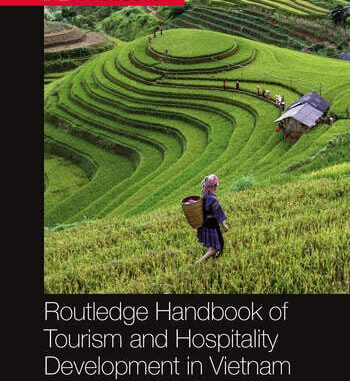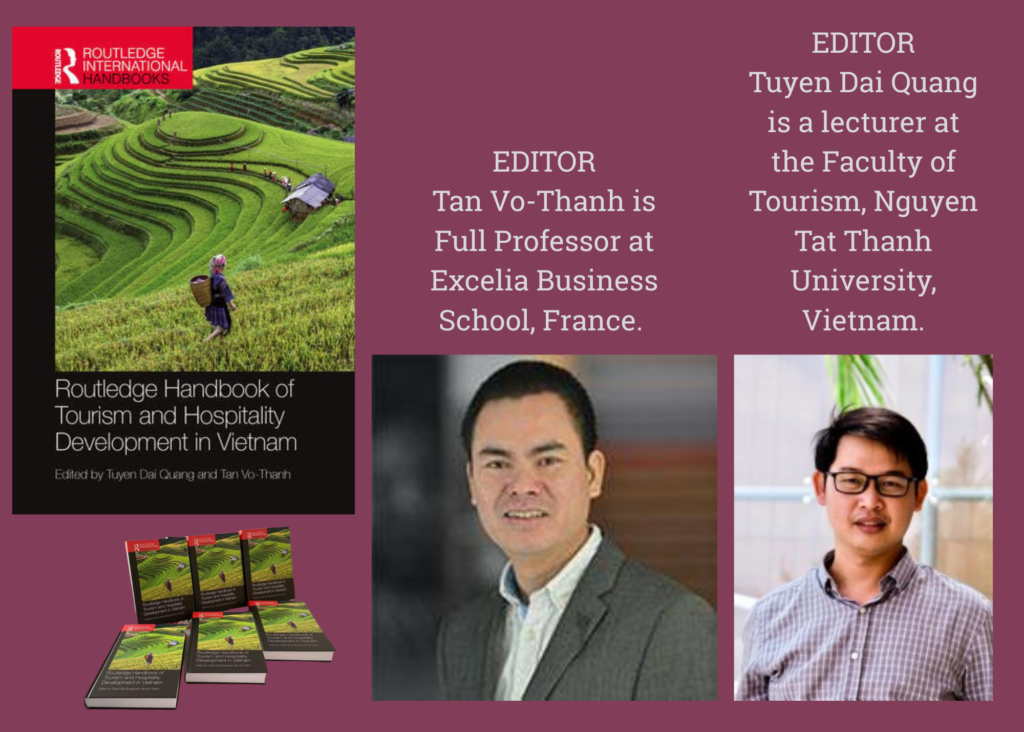
(Introduced by Eris White)
In the wake of global shifts brought on by the pandemic, the Routledge Handbook of Tourism and Hospitality Development in Vietnam emerges as a definitive and timely contribution. Spanning 470 pages, this ambitious volume, published by Routledge on March 27, 2025, offers a vibrant, interdisciplinary tapestry of scholarship. Written entirely in English and framed by perspectives from both local Vietnamese experts and international scholars, the book offers something rare in global publishing: a deep, textured portrayal of Vietnam’s tourism and hospitality landscape, one that honours local voices while engaging global thought.
At the heart of this landmark volume are two visionary editors: Associate Professor Tuyen Dai Quang of Nguyen Tat Thanh University, Vietnam, and Professor Tan Vo-Thanh of Excelia Business School, France. Their collaborative leadership bridges not only continents but also scholarly traditions, blending local knowledge with global academic rigor. Quang, an anthropologist of tourism, brings profound insight into heritage, sustainability, and community, based practices. Vo-Thanh contributes extensive expertise in digital transformation, smart tourism, and organizational behaviour. Together, their editorial direction enables a chorus of diverse voices to speak in unison, toward shared goals of equity, sustainability, and innovation.
Divided into six comprehensive parts, the handbook invites readers to explore key themes, from post-COVID recovery and responsible destination marketing to workforce development and educational reform.
Part I – Framing the Landscape: Post-COVID Realities: The opening section sets the scene with Tuyen Dai Quang and Tan Vo-Thanh’s overview of Vietnam’s tourism sector in the aftermath of COVID-19, outlining the sector’s unique vulnerabilities and resilience strategies. Their insights ground the book in lived realities and contemporary urgency.
Part II – Destination Development and Cultural Encounters:This section takes readers on a cross-country journey, exploring the complexity of Vietnam’s tourism identity. Studies like Thu Thuong Do and colleagues’ work on the concept of “touristification” highlight gaps in Vietnamese literature, while Ngan Thi Phan‘s chapter on Bến Tre’s culinary heritage uncovers how food becomes a vessel of cultural transmission. Tien Bich Ma’s exploration of cruise tourism shows how local perceptions shape support for development, and Diem-Hang Le Doan and Khanh-Ha Thi Dinh advocate for multidimensional wellness tourism in Thừa Thiên Huế, a region that surfaces repeatedly in the volume. The aesthetic dimensions of tourism are thoughtfully examined in Anh Thu Le’s essay on kitsch, a nod to the artistic and symbolic layers often overlooked in development discourse.
Part III – Sustainability in Action: Vietnam’s evolving relationship with the environment finds compelling representation in this section. Tran Nien Tuan and colleagues’ study of luxury hotel food waste in Danang adds a practical dimension to green hospitality. Meanwhile, community-based tourism is highlighted through asset-based development strategies in Đức Phổ (Quang et al.), reflecting a shift from resource-dependence to resource empowerment. The ecological awareness is not only technical but deeply relational. Mai Thi Kieu Lan’s work on tourist behaviour in Dalat and Thuy-Hien Thi Dang’s exploration of resident perceptions in Hue emphasize the importance of empathy, responsibility, and connection—cornerstones of a multicultural tourism ethic.
Part IV – Experience, Memory, and Identity: This rich section bridges the emotional and behavioral worlds of travelers. Giang Nu To Truong and team present religious tourism as both spiritual practice and heritage preservation, while Loi Anh Nguyen and Vi Tuong Ta bring us to the Cái Răng floating market, a site of vivid authenticity and memory-making. Digital culture also plays a leading role. Chapters on Airbnb users, online reviews, and e-commerce dining platforms by Doan Do, Chu, Vo, and others reflect how Vietnamese consumers, particularly Gen Z and Gen Y, are reshaping hospitality engagement through technology. Notably, Nghi Huu Nguyen’s narrative on TripAdvisor backpacker tales turns global perception into a site of storytelling, challenging the linear flow of East-to-West tourism literature.
Part V – Workforce and the Future of Learning: Education and employment, especially through an intersectional lens, take center stage here. Tin Doan et al. delve into the career pathways of young Cotu people, revealing how ethnicity, age, and tourism intersect in rural Vietnam. Meanwhile, studies on work-family conflict, employee engagement, and digital learning attitudes speak to broader systemic pressures and potentials in the hospitality sector. Duong-Giang Nguyen’s work on competency building in state-run hotels and Nghia Thi Minh Nguyen’s application of TAM models to student e-learning further reveal how Vietnam is investing in its human capital, one of the most crucial yet overlooked aspects of tourism sustainability.
Part VI – Looking Ahead: The book closes with a forward-looking reflection by the editors, who chart directions for future research. In a world where tourism is increasingly a space of cultural negotiation, digital transformation, and ecological consciousness, Vietnam stands out as a compelling case study.
A Cultural and Academic Bridge
What distinguishes this volume is not just its breadth, but its ability to weave multiculturalism into every thread of inquiry. Whether through indigenous perspectives, culinary traditions, or generational shifts in digital behavior, the Routledge Handbook of Tourism and Hospitality Development in Vietnam offers an academic home for voices often underrepresented in global tourism discourse. For scholars, policymakers, students, and practitioners, this handbook is more than a reference. It’s a mirror, reflecting the intricate interplay of people, place, and practice. And it’s a map, pointing toward a more inclusive, sustainable, and pluralistic future in global tourism.

